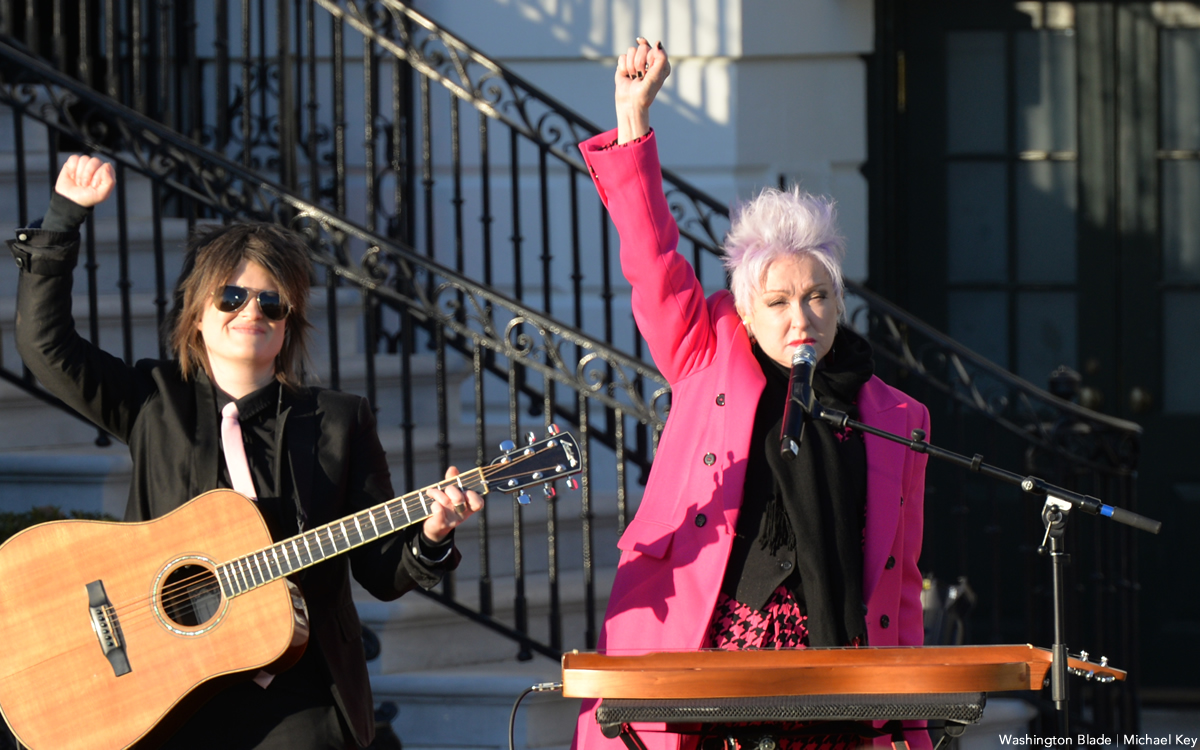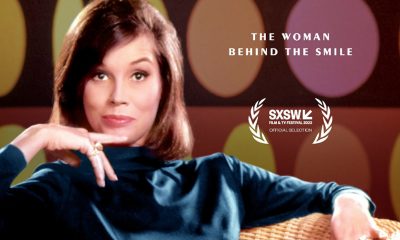Music & Concerts
Great balls of honesty
Singer/actor Levi Kreis finds redemption in open living and catchy pop songs

Levi Kreis and Eric Himan
Monday at 7:30 p.m.
227 Maple Ave. East
Vienna, VA
703-255-1566

Levi Kreis joins fellow singer/songwriter Eric Himan on the 'SideXSide Tour' at Jammin' Java Monday. (Photo courtesy of LaFamos)
In an extraordinary double-bill of gay musical talent, singer-songwriters Levi Kreis and Eric Himan perform together here for one night only — Monday — at Jammin’ Java, a music club in Vienna, in suburban Fairfax County, Virginia.
Tony Award-winning Kreis himself stands on the verge of big-time success with superstardom likely just around the corner, born of songs both tender and tough-minded, about being gay and searching for love in today’s changing America.
Kreis and Himan each have new albums fully “out” in their openness, their music videos are often in heavy rotation on MTV’s Logo Channel, and their songs are big on Sirius XM satellite radio’s OUTQ Channel. Kreis’s new album, “Where I Belong,” is “all about acceptance and surrender,” he says, while Himan, who is often compared with singers John Mayer, Ani DiFranco and Tracy Chapman, already has six studio albums including his newest, “Resonate.”
He opens for Kreis, who vaulted to mainstream recognition earlier this year when he won the Tony for Best Actor in a Musical playing rock ‘n’ roll icon Jerry Lee Lewis, the Louisiana wild man famed for “Great Balls of Fire,” in the hit Broadway show “Million Dollar Quartet” about what was arguably rock’s first supergroup.
On Dec. 4, 1956, that legend was born when Lewis, also renowned for “A Whole Lotta Shakin Goin On,” and Elvis Presley, already well into his own career, and Johnny Cash came together for one time only in an impromptu jam session at Sun Records in Memphis, joining Carl Perkins, a rock original who had recorded “Blue Suede Shoes” before Elvis. Their recording session there happened purely by chance and it was lightning in a bottle. “Million Dollar Quartet” tells the story of this improbable event with Kreis in a star-making role he wolves down like a moon pie with a Dr Pepper chaser.
But at Jammin’ Java in Vienna, Kreis appears on stage as himself, in “Where I Belong: An Intimate Evening with Levi Kreis.” His signature sound in what he calls a “SidexSide Tour” with Himan is all his own and far from the volcanic eruption of a Jerry Lee Lewis. Like Lewis, Kreis is also a Southern boy, but at 29, he is a soulful pop-gospel crooner whose sultry-but-smooth-as-silk voice hints much more of Harry Connick, Jr. and confessional bearings of the heart than tearing up the floor like the hyper-kinetic Lewis.
With his freshly-minted Tony award and his new album, Kreis is the proverbial overnight sensation, simply one years in the making. Now on his national tour during those Mondays when Broadway shows go dark, he seeks that connection with his audience that studio albums never provide. His fiercely loyal fan basis has long been centered in LGBT circles but now grows by new leaps and bounds, and industry insiders predict he has all the right qualities to become a big star. It’s his showmanship, they say, and those charismatic heart-throb looks and sadly soulful voice. But there’s also his catchy love songs marked with pop sensibility and laments for lost love seasoned with a counterpoint of hope, like the upbeat break-up song, “Gonna’ Be All Right.”
His messages — from “Let it rain, let it pour, this is what I came here for” in the closing refrain of his characteristically upbeat love song, “I’m Not Afraid,” to the urgent demand of “give me everything or nothing at all” — spark in listeners recognition that they too have felt these same turbulent feelings in love. Kreis has been openly gay since his debut album in 2005, “One of the Ones.”
“These were personal songs about guys,” he says, “and I decided to come out with this CD.”
Even so, sometimes his lyrics are written as if sung to a woman and others are quite gender-neutral like the gospel-styled “Nothing At All.” Many of his fans today are, he says, “35- to 40-year-old straight women.” His looks help in that department, certainly, but also his accessible songs and obvious talent — he’s also a keyboard wiz.
His origins are buckle on the Bible Belt. Born in Oliver Springs, Tenn., where he grew up in a fundamentalist Baptist home, christened Matthew, it was only later that he decided to change his name to Levi after studying the Torah, the five books of the prophet Moses. Renaming himself was a definite statement of what he calls his “amalgamated spiritual views from a lifetime of seeking.”
“I may not fit neatly into any box, and I certainly don’t fit into Christianity, but I still seek the experience of God, and that’s the bottom line,” he told the Blade in a phone interview from New York City. “I believe in a very all-inclusive God, expressing itself through you and through me just as we are.”
These days, in fact, he is starting his third year studying religion with classes offered through the United Centers for Spiritual Living, connected with the Unity Church.
His singing and his spirituality remain in their essence one and the same. He learned his gospel and country roots, he says, “when I was knee-high to a grasshopper,” and in church he says, “you learn very quickly that people sing out of conviction. They are singing to let you know that you are loved, forgiven and you can be healed.”
“I was always singing,” he says. “My grandmother would tell people how I would sing in my crib before I could even stand, holding a crayon as a microphone and going ‘ga-ga-ga’!”
Aged 6, he came home from kindergarten graduation and sat down at the piano playing the orchestral march “Pomp and Circumstance” by ear. His legs were still so short his older brother had to work the pedals for him.
His parents soon enrolled him in formal piano lessons and at 8 he began to perform in churches, touring throughout the South, and he produced his first gospel album – “Just Trust” – at age 15. While still in high school, he studied classical piano and music theory and history at Vanderbilt University in Nashville, and after finishing high school he moved on to Belmont University, the largest Christian university in Tennessee.
There, he says he outed himself in confidence to his roommate who then exposed him to school officials when he was just a few short credits from graduation. After debating expelling him, they decided not to, but he says he was meanwhile “so embarrassed that it was just more than I could handle.” He had struggled with his sexual orientation much earlier in secret, in seventh grade entering what he calls “Christian counseling” for so-called “reparative” or “reorientation therapy,” and he kept this up for six years without telling his parents.
He left Belmont before completing his degree, moving to Los Angeles to begin a career in show business, and quickly was picked to go on tour with the rock-musical “Rent.” He also appeared in several indie films while trying to make a go of it as a singer, and he went through more than a few record labels before breaking with the last of them (Atlantic Records) in 2004, and with only $200 in his pocket he decided to go into a recording studio. That independently produced album “One of the Ones” came out in 2005 and it began to sell following his appearance that year on the Donald Trump reality-TV show, “The Apprentice.”
What made this album different was that he was now open about his sexuality. And not just his career but also his life began to flourish.
“My life has been so affected in a positive way by coming out,” he says. “I’m not very good at keeping secrets. I value a peaceful life, being calm, and it’s important to live transparently. I just couldn’t hold that level of grief, that weight inside my body, any more, and now I can feel truly perfect in the eyes of God.”
His next album, “The Gospel According to Levi,” was released in 2007, and one of its songs, “We’re Okay,” was written openly to his mother to try to reconcile the rift that had grown between them after he came out. He says she refused to listen to it for a long time but finally saw the music video and then called him and admitted that she had never allowed herself to just listen to the words.
“I want to thank you,” he says she told him, “for deciding to love despite the differences we have.”
He has also since reconciled with the college roommate who outed him, and Belmont University recently even invited him to return to complete his degree, something he says he may do early next year.
That same year, he also took a break from touring to join the original cast of “Million Dollar Quartet,” at first in workshops in Seattle and then in regular performance in Chicago, where it was co-directed by Eric Schaeffer, the gay artistic director of Arlington’s Signature Theatre. Kreis laughs and says “me and Eric, we were were the lone gays” in what he calls for short “MDQ,” a production that he says is highly “testosterone-filled.”
Under Schaeffer’s direction still, the show moved to Broadway in April. From the show’s beginning, Kreis’s enthusiasm to recreate the combustible Jerry Lee Lewis on stage meant he would vault over pianos to land standing-up at the keyboard, especially in what he calls “the show’s very exuberant encore, where each of the four legends comes out for one last song.” The strain of such showmanship has since required reconstructive surgery on both of his knees, he admits, and for a time he wore a full leg brace, “and now I keep my feet as close to the ground as I can.”
Kreis actually met Lewis, at 75 the only “quartet” member still alive, in September when Lewis sat in for one show, as have other stars like Melissa Etheridge and Leslie Gore. Kreis and Lewis met at his hotel room, and he says that “Jerry Lee was so gracious, so loving and supportive, so witty, and so lively.”
After Kreis laid out his own Southern Baptist credentials, “soon I felt just like family with him and an undeniable bond.” Their duet, recorded separately – a cover of the Motown song “Money (That’s What I Want”) – will appear on Lewis’s next album.
Music & Concerts
Washington chorale kicks off Christmas with vibrant program
‘Thine Own Sweet Light’ concerts planned

The full Washington Master Chorale will return for its annual holiday concert tradition with “Thine Own Sweet Light” on Friday, Dec. 19 and Sunday, Dec. 21 at St. Ann’s Catholic Church (D.C.) and Church of the Epiphany (D.C.).
The concert will feature the rich sounds of the 50-voice, a cappella chorus performing lush, seasonal choral music inspired by the theme of light. Highlights include Edvard Grieg’s “Ave Maris Stella,” Eric Whitacre’s “Lux Aurumque,” and Christopher Hoh’s “Holy, Holy, Holy is the Lord God of Hosts.” The program will also present a new work by Barcelona composer Josep Ollé i Sabaté, along with charming holiday folk songs and seasonal favorites.
For more details, visit the Washington Master Chorale website.
Music & Concerts
Queer mega stars (and allies) ready to take D.C. stages this fall
Watch LGBTQ icons light up stages across the DMV as they sing, dance, and drag their way through spectacular shows.

One of the best ways to welcome fall is by catching LGBTQ performers (and their allies) lighting up some of the D.C. area’s biggest stages. From country and pop to drag and rock, the season is packed with shows you won’t want to miss.
Maren Morris – The country, rock, and pop diva—known for hits like “The Bones” and for standing up against Nashville’s anti-LGBTQ voices—takes the stage at Wolf Trap (1551 Trap Rd, Vienna, Va.) on Friday, Sept. 12 at 8 p.m. Tickets start at $64.
RuPaul – The mother of modern drag and host of “RuPaul’s Drag Race” will spin a DJ set at Echostage (2135 Queens Chapel Rd NE) in Northeast D.C. on Sept. 20. Before RuPaul swaps wigs for headphones, Trade and Number 9 owner Ed Bailey will warm up the decks. For tickets and details visit echostage.com.
Conan Gray – The queer pop prince, celebrated for his Gen Z anthems like “Heather” and “Maniac,” brings his Wishbone Pajama Show to EagleBank Arena in Fairfax, VA, (4500 Patriot Cir) on Sept. 20 at 8 p.m. Tickets start at $113. For more info visit shop.conangray.com/pages/tour.
All Things Go Music Festival – With a lineup that includes Noah Kahan, Lucy Dacus, Kesha, Clairo, Doechii, and more, the beloved LGBTQ-friendly festival takes over Merriweather Post Pavilion (10475 Little Patuxent Pkwy, Columbia, Md.) Sept. 26–28. For tickets and details visit allthingsgofestival.com.
BERTHA: Grateful Drag – This unique tribute brings drag artistry and the sounds of the Grateful Dead to The Atlantis (2047 9th St NW) on Sept. 27. Tickets start at $47 at theatlantis.com.
Peach PRC – Rising Australian pop star and out lesbian, whose confessional tracks like “Perfect for You” and “Forever Drunk” have made her a queer TikTok darling, performs at The Atlantis on Sept. 29 at 6:30 p.m. The show is general admission only. Additional details are on theatlantis.com.
Addison Rae – The TikTok star-turned-pop princess, who’s crossed over into music with glossy hits like “Diet Pepsi” brings her sold out show to The Anthem (901 Wharf St., S.W.) on Sept. 30. Tickets are sold out, but resale options start around $80. For more info visit theanthemdc.com.
The Rocky Horror Picture Show 50th Anniversary – Celebrate the cult classic that’s been a queer midnight-movie staple for decades, with Barry Bostwick (a.k.a. Brad Majors) at the Warner Theatre (513 13th St., N.W.) on Oct. 2 at 8 p.m. Tickets start at $41 via Ticketmaster.
Chaka Khan, Patti LaBelle, Gladys Knight & Stephanie Mills – Four legends, one stage. Between Khan’s funk, LaBelle’s soul, Knight’s R&B, and Mills’ powerhouse vocals, this concert at Capital One Arena (601 F St NW) on Oct. 3 at 8 p.m. promises pure diva magic. Tickets start at $103. For more details visit capitalonearena.com.
Lorde – Joined by The Japanese House and Chanel Beads, the Grammy-winning New Zealand singer-songwriter behind “Royals” and “Solar Power” returns to The Anthem on Oct. 4 at 7 p.m. Lorde has long been embraced by queer fans for her dreamy pop and subversive lyrics. For more info visit theanthemdc.com.
Andy Bell (of Erasure) – The British queer rock icon, best known for synth-pop classics like “A Little Respect” and “Chains of Love,” brings his Ten Crowns Tour to the Lincoln Theatre (1215 U St., N.W.) on Friday, Oct. 17 at 8 p.m. Tickets are $90.45.
Doechii – The self-described queer “Swamp Princess”—and WorldPride 2025 headliner—continues her breakout year with the Live from the Swamp Tour at The Anthem on Oct. 21 at 8 p.m. Known for blending rap, R&B, and avant-garde performance art, Doechii is one to watch. Tickets start at $153.
Neon Trees – The out-and-proud Utah rockers behind “Everybody Talks” and “Animal” perform at the Lincoln Theatre on Friday, Oct. 24 at 8 p.m. Lead singer Tyler Glenn, who came out publicly in 2014, has become a strong queer voice in alternative rock. For tickets and info visit impconcerts.com.
Sasha Colby – The “RuPaul’s Drag Race” Season 15 winner strips down on the Stripped II Tour at the Warner Theatre on Nov. 2 at 8 p.m. Tickets available now on Ticketmaster.
Lola Young – The bisexual indie-pop sensation, whose raw songwriting has earned her millions of TikTok fans and multiple chart soaring hits visits The Anthem on Nov. 9 at 8 p.m. Tickets are still available.
Opera Lafayette
Featuring Mary Elizabeth Williams as Dido
+ Elijah McCormack, Chelsea Helm
Oct. 16, 7:30 p.m.
Sixth & I
PostClassical Ensemble
The Pale Blue Do: A Musical Voyage Inspired By Nature
Featuring National Geographic’s Enric Sala, Guest Curator
Wednesday, November 19, 7:30 p.m.
Terrace Theater
Washington Concert Opera
Starring Kate Lindsey, Theo Hoffman, John Moore, and Fran Daniel Laucerica
Nov. 23, 6 p.m.
Lisner Auditorium
Washington Master Chorale
An intimate a capella concert taking place in an architectural jewel, featuring cherished choral gems from Anglican and Catholic tradition and early American hymns. The concert will also present the world premiere of Christopher Hoh’s Holy, Holy, Holy is the Lord God of Hosts, and hymn singing featuring Robert Church, organist and choirmaster at St David’s.
Oct. 18, 7:30 p.m.
October 19, 5 p.m.
St. David’s Episcopal Church
Music & Concerts
Cyndi Lauper ready to have fun in Virginia
Superstar to bring final leg of farewell tour to Jiffy Lube Live

Superstar Cyndi Lauper will bring the final leg of her farewell tour “Girls Just Wanna Have Fun” to Bristow, Va., on Thursday, July 24 at Jiffy Lube Live.
Lauper’s international Farewell Tour – her first major headlining run in a decade – kicked off in North America last October, and included her first time ever headlining (and selling out) Madison Square Garden. Lauper’s performances have earned raves from the New York Times, Rolling Stone, Billboard, and many more, and surprise guests have included Chaka Khan, Sam Smith, and Hayley Williams. The tour just visited the U.K. and Europe, and will head to Australia and Japan in April.
Tickets are available on Live Nation’s website.
-

 Sponsored4 days ago
Sponsored4 days agoSafer Ways to Pay for Online Performances and Queer Events
-

 District of Columbia4 days ago
District of Columbia4 days agoTwo pioneering gay journalists to speak at Thursday event
-

 Colombia3 days ago
Colombia3 days agoBlade travels to Colombia after U.S. forces seize Maduro in Venezuela
-

 a&e features4 days ago
a&e features4 days agoQueer highlights of the 2026 Critics Choice Awards: Aunt Gladys, that ‘Heated Rivalry’ shoutout and more




















